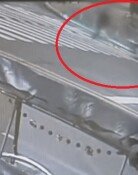Effective Punishment for N. Korea
Effective Punishment for N. Korea
Posted May. 25, 2010 11:38,
President Lee Myung-bak made clear Monday a major shift in North Korea policy at home and abroad by calling the Norths sinking of the Cheonan a military provocation against the Republic of Korea. He also pledged an immediate military response to additional provocations by Pyongyang. The sinking of the naval corvette was not only an attack on South Korea but also a massacre of its people. President Lees responses are justified and the sole responsibility lies with the North, which violated the U.N. Charter, the 1953 armistice and the Inter-Korean Basic Agreement.
President Lee demanded an apology from the North to the Republic of Korea and the international community and immediate punishment of those responsible for the sinking. This is no time for Pyongyang to claim that the investigation results agreed on by the international community are a fabrication by Seoul. The North must listen carefully to President Lee, who says the ultimate goal is not military confrontation but stability and peace on the Korean Peninsula.
The presidents speech was not enough to soothe the pain and suffering of the South Korean people. The 2,800 characters of his speech could hardly ease the peoples anger over the past two months since the surprise sinking of the Cheonan on the night of March 26. He disappointingly failed to directly mention North Korean leader Kim Jong Il, just blaming North Korean authorities and the North Korean regime as those who attacked the ship. The North is a country that cannot shoot a gun without Kims order. Perhaps President Lee did not directly mention Kim in a strategic choice.
The chief executive fittingly chose to make his national address at the War Memorial of Korea. The corridor of the memorial bears the names of 210,000 people, including soldiers, police officers and U.N. forces, who died in the Korean War, Vietnam War, and North Koreas armed guerilla attacks on the South. A memorial stone honors unknown soldiers as well. The names of the 46 fallen Cheonan servicemen are engraved at the War Memorial of Korea, a place where the spirit of patriotism remains alive. Kim Jong Il must clearly remember President Lees state of mind and determination at this place.
As President Lee said, the Korean Peninsula is facing a critical change. A major shift in inter-Korean relations is inevitable. Because the Cheonan sinking was clearly the Norths military provocation, action with extraordinary determination is inevitable to defend the Republic of Koreas 50 million people, property and country. Now is the time to correct Pyongyangs erroneous behavior that was tamed the wrong way under the sunshine policy initiated by previous liberal governments in the South.
The United Nations recognizes the right to self-defense immediately in case of a military provocation. If the country is hit once, it will retaliate two or three times, and in the event of a surprise attack, a strike on the base is justified. The South Korean military has resumed psychological warfare in the border region after a hiatus of six years. The North Korean military and people will have a better understanding of the reality of the Kim Jong Il government through loudspeakers and large screens. This is sure to rattle Pyongyang. Measures such as the advanced deployment of the U.S. 7th Naval Fleet in the Yellow Sea, South Korea-U.S. joint submarine training, the ban on North Korean ships from passing through South Korean territory, and stricter inspection of North Korean ships under U.N. resolutions 1874 and 1718, will be hard to stand. The suspension of inter-Korean trade and exchanges excluding the Kaesong industrial park is a measure that will help control Kim Jong Ils funds.
President Lees speech indicates that a firm response will be put into action instead of being just talked about. Effectiveness is critical in punishment. A thoroughly thought-out plan is needed and all should move in unison. The South Korean government, military and intelligence agency must work together and cooperate, and a system that can manage and control this is also required. In addition, the presidents determination and leadership are critical.
Action carries risk. North Korea could attempt to check or deter South Koreas determination after sanctions are imposed. Pyongyang could also conduct a military provocation or adventure, having threatened to shoot at loudspeakers. Another danger is the Norths waging of a psychological war and cyber terrorist attacks seeking internal division and even a civil war within South Korea.
South Korea also needs help from the international community. It is encouraging that 21 countries and major international organizations issued a statement backing Seoul after the release of the investigation results for the Cheonan sinking. Diplomatic efforts should go to helping other countries and international organizations participate in criticizing and sanctioning the North. China and Russia must be persuaded through all diplomatic channels because their help is needed to elicit additional U.N. sanctions on North Korea.
The Cheonan sinking was a sudden attack by the North that showed the limits to national defense, but the South Korean government and military must also take this as a good lesson. If the Lee administration falls for Pyongyangs tricks or suffers a surprise attack by the North again, it will forever be labeled an administration incapable of ensuring and protecting national security.







